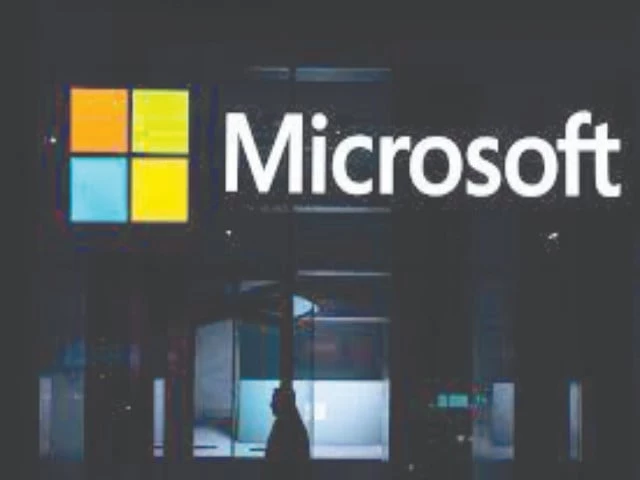BRUSSELS:
The European Union has launched fresh scrutiny of digital giants including Apple, Snapchat and YouTube over online child safety, as Britain moved to tighten oversight of Google’s powerful search business in a widening global crackdown on Big Tech.
The European Commission on Friday demanded detailed explanations from major platforms about how they are protecting minors from harmful and illegal content, as 25 of the bloc’s 27 member states voiced support for exploring continent-wide restrictions on social-media access for children.
Inspired by Australia’s recent move to ban under-16s from social platforms, Brussels is studying whether to impose similar limits across the EU. Only Belgium and Estonia withheld support, with the latter arguing that “digital education and critical thinking” were more effective than outright bans.
EU tech chief Henna Virkkunen said the bloc was “tightening enforcement” under its flagship Digital Services Act (DSA), warning that “privacy, security and safety have to be ensured, and this is not always the case”.
As part of ongoing “investigative actions”, the Commission has sent formal requests for information to Snapchat, Apple and Google. Officials asked Snapchat to explain what safeguards it has to prevent access by users under 13 and to curb the sale of drugs and vaping products via the app.
Apple’s App Store and Google Play were asked to detail how they restrict minors from downloading inappropriate or illegal software — including gambling apps or so-called “nudify” tools used to generate non-consensual sexualised images. Brussels also requested data on how both companies apply age ratings and enforce parental controls.
While such requests do not amount to accusations of wrongdoing, they can lead to full probes and potential fines if violations of the DSA are uncovered. Snapchat said it was “deeply committed to ensuring safety” and had already built tools to reduce risks to young users.
YouTube, owned by Google parent Alphabet, was asked to clarify how its recommendation algorithm filters harmful content for minors after reports that inappropriate material was reaching under-age audiences. Google said it offered “robust parental controls and protections for younger users” and would “keep expanding” its safeguards.
Meanwhile, the EU continues separate investigations into Meta’s Facebook and Instagram and China’s TikTok over allegations their platforms exploit addictive design features to keep children engaged.
In a related push, EU telecoms ministers met in Denmark to discuss new age-verification mechanisms. Commission President Ursula von der Leyen personally backs the idea of a common digital age of majority and has set up an expert panel to examine the proposal.
Twenty-five countries, joined by Norway and Iceland, signed a declaration supporting the initiative, citing a “pressing need” to shield minors from online exploitation and manipulation. Belgium declined to sign the joint declaration, saying it wanted to remain open to different policy tools.
Estonia openly criticised potential bans, stressing that empowerment through education was a more sustainable strategy. Denmark and France, however, are moving ahead with national measures to ban social-media use for under-15s, reflecting growing political momentum behind child-protection legislation across Europe.
In London, Britain’s Competition and Markets Authority (CMA) took its own swing at Big Tech by formally designating Google as having “strategic market status” (SMS) in online search — a move paving the way for tougher, tailor-made regulation of the US giant.
After a nine-month investigation, the CMA concluded that Google holds a “substantial and entrenched market power”, controlling more than 90% of UK online searches. The designation allows regulators to impose bespoke obligations to promote competition and prevent abuses of dominance.
“We have found that Google maintains a strategic position in the search and search advertising sector,” said Will Hayter, the CMA’s executive director for digital markets. More than 200,000 UK businesses rely on Google’s advertising tools, and regulators say stronger competition could ultimately lower costs across the economy.
Google warned against “unduly onerous regulations,” arguing that restrictive measures could hinder innovation and slow product launches in Britain. “Many of the ideas being raised would inhibit UK innovation and growth,” said Oliver Bethell, Google’s senior director for competition.
He added that Britain’s relative openness had allowed it to benefit from early access to Google’s newest services. The CMA said Google’s new Gemini AI assistant would not yet be included in the designation but will remain under review.
Other AI-based search features will fall under the new status. The regulator will consult this year on specific rules to impose under the SMS regime, similar in scope to the EU’s Digital Markets Act (DMA), which threatens heavy fines for repeat offenders.
Google and Apple are also under parallel investigation to determine whether their control of mobile ecosystems – including app stores and payment systems – warrants further SMS designation.
The twin moves by Brussels and London signal a tightening transatlantic consensus that tech giants must face stronger accountability — whether to protect children or ensure fair competition.
As Brussels scrutinises the digital world’s treatment of minors and London reins in market dominance, both sides of the Channel appear united on one front: the age of unregulated Big Tech is drawing to a close.


